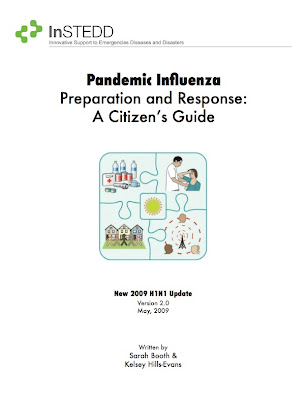Wow. Over the past few weeks, interest in InSTEDD and in our tools: GeoChat, Mesh4x, Evolve, and the Innovation Lab, with a slew of additional integration requests to our advisory staff, have each really taken off. We find we're receiving about a four requests a week for some sort of work somewhere in the world. Over the past few days, for example, we've had conversations about opportunities in Israel, Pakistan, Georgia (the one next to Belarus, not the one with peaches), Italy, and Tajikistan.
To get a jump start on some of these conversations, and to wrap our description into a neater package, we've developed a Fact Sheet. It's brief, just a two-pager, plus a page around a few of our achievements. To keep it brief we've minimized some of the very cool work being done by Taha Kass-Hout in Atlanta, and the separate work being done by Romdoul Kim and the Innovation Lab team in Cambodia, but it's enough to get the flavor of our skills.
Please feel free to download the Fact Sheet here, and don't hesitate to contact me, or anyone at InSTEDD, if there is some project you think might be interesting for us to do together. We're always watching for useful humanitarian support opportunities and we enjoy the conversations.
You can reach me, as always, at Rasmussen@InSTEDD.org, and on my direct cell at 360-621-3592.
Eric
Friday, May 29, 2009
 A brief (but useful!) Fact Sheet about InSTEDD
A brief (but useful!) Fact Sheet about InSTEDD
Posted by
rasmussene
at
2:09 PM
1 comments
![]()
![]()
Saturday, May 9, 2009
 New H1N1 Swine Flu Citizen's Guide Update
New H1N1 Swine Flu Citizen's Guide Update

The new Pandemic Influenza Citizen's Guide, edited by Sarah Booth and Kelsey Hills-Evans to incorporate information around the recent H1N1 (Swine) flu outbreak, is now posted here.
Posted by
rasmussene
at
2:30 PM
0
comments
![]()
![]()
Friday, May 1, 2009
 Using InSTEDD's Evolve for Tracking and Collaborating around the 2009 H1N1 Flu Event:
Using InSTEDD's Evolve for Tracking and Collaborating around the 2009 H1N1 Flu Event:
Last week, InSTEDD stood up a workspace to further aid experts and responders collaborating around emerging reports related to the 2009 H1N1 pandemic influenza event.
The workspace is based on InSTEDD's Evolve, an online application which allows a team to collaborate around multiple streams of information to assess, characterize, and respond to an event with the assistance of automated services.
Our Evolve Space offers a comprehensive set of collaborative features, including
- commenting,
- tagging,
- mapping (both user generated and automated),
- the relating of multiple alerts to each other,
- searching and filtering (by keyword and by location),
- specifying a time window,
- adding attachments,
- subscribing (currently in the form of a web-friendly format known as GeoRSS and through an email subscription),
and more.
The Evolve Workspace is also equipped with an intelligent process (sometimes referred to as a machine-learning algorithm) that "learns" from anything provided by human experts (e.g. adding a keyword or a tag, or correcting the incorrect mapping of an item). This intelligent process quickly and accurately learns to follow advice from expert humans and we're showing a 95% confidence level for the automated selections based on previous tests. The system soon starts suggesting tags, as well as correcting itself, and gradually offers even better results over time.
Have you an H1N1 alert or item you like to share with the community? You can easily contribute that alert by clicking the "Add Item" feature on our Evolve H1N1 workspace.
If you have a background in public health, international relations, diplomacy, social work, or emergency response and are interested in contributing actively to this effort please contact us at info@instedd.org.
For low volume announcements, you can follow us on Twitter
Collaborative Analytics and Environment for Linking Early Event Detection to an Effective Response
Best Poster Award for Improving Public Health Investigation and Response at the Seventh Annual International Society for Disease Surveillance Conference
Posted by
rasmussene
at
12:09 PM
0
comments
![]()
![]()


